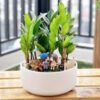Why Feng Shui is Important for the Elderly in the Family

As people age, their needs change, and creating a living space that supports physical health, emotional well-being, and overall happiness becomes even more crucial. Feng Shui, the ancient Chinese practice of arranging one’s environment to promote balance and harmony, plays a significant role in shaping the life quality of elderly individuals. In traditional Feng Shui, the belief is that the energy in our living space directly impacts our health, relationships, and prosperity. For the elderly, a well-designed space can enhance comfort, minimize health risks, and contribute to a more peaceful, fulfilling life.
This article explores why Feng Shui is essential for elderly individuals, focusing on how it improves their quality of life, promotes well-being, and creates a supportive environment. We will also discuss the core Feng Shui principles that can be applied to homes for older adults to help them live their best lives.
1. Feng Shui and Its Role in Health
One of the primary concerns for elderly individuals is maintaining good health. As we age, the body becomes more vulnerable to various illnesses and physical limitations, making it essential to create a living space that supports health and healing. Feng Shui emphasizes the importance of Chi, the life force or energy that flows through everything in our environment. When Chi flows smoothly and harmoniously, it supports health, vitality, and well-being. On the other hand, blockages or disruptions in Chi can lead to physical and emotional problems.
Health and Vitality Through Proper Flow of Chi
Feng Shui focuses on creating a balanced energy flow within the home. For elderly individuals, a positive energy flow can help:
- Enhance Physical Health: Proper Feng Shui arrangements can promote better circulation of energy, improving the overall vitality and reducing fatigue.
- Reduce Stress: A clutter-free and balanced environment reduces mental strain and promotes relaxation, which can be especially beneficial for older adults who may face anxiety or depression.
- Minimize Accident Risks: Feng Shui also considers practical safety, such as ensuring clear pathways and avoiding sharp furniture corners, which can be dangerous for older adults.
The Impact of Bedroom Feng Shui on Sleep
One of the most common issues for elderly individuals is poor sleep quality. Feng Shui principles can help enhance sleep by creating a relaxing and calming bedroom environment. For example:
- Optimal Bed Placement: In Feng Shui, the bed should be placed in the “command position” so that the individual can see the door without being directly in line with it. This helps create a sense of safety and reduces anxiety, promoting a restful sleep.
- Avoiding Electronics: Keeping electronics such as TVs and computers away from the bedroom helps create a tranquil environment that fosters deep, uninterrupted sleep.
Feng Shui also suggests using calming colors, soft lighting, and pleasant scents to enhance sleep quality. These small adjustments can make a big difference in the health and well-being of older adults.
2. Promoting Emotional Well-Being
As individuals age, emotional well-being becomes just as important as physical health. The emotional and mental state of elderly people can impact their overall quality of life. Feng Shui can help create an environment that nurtures positive emotions, fosters happiness, and reduces feelings of isolation or anxiety.
Creating a Nurturing Space
For elderly individuals, it’s essential that their living environment feels safe, comforting, and supportive. Feng Shui helps create spaces that resonate with warmth and love, which can uplift the emotional well-being of older adults. Key considerations include:
- Comfortable Furniture: Ensuring that furniture is ergonomically suitable and easy to use is crucial for elderly people. In Feng Shui, comfortable seating and well-placed furniture help create a nurturing atmosphere that encourages relaxation.
- Family Photos and Personal Items: Including family photographs and personal belongings in the home allows elderly individuals to feel connected to loved ones. This can help combat feelings of loneliness and increase emotional well-being.
- Colors that Encourage Calmness: Soft, gentle colors such as pastel blues, greens, and earthy tones are ideal for creating a calming atmosphere. These colors can help alleviate stress and promote a peaceful state of mind.
The Importance of Natural Elements
The connection between nature and well-being is a central concept in Feng Shui. Bringing elements of nature indoors has numerous benefits for elderly individuals:
- Plants: Adding indoor plants to the home can improve air quality, reduce stress, and bring a sense of tranquility. Plants like peace lilies, bamboo, and spider plants are great options for enhancing the energy in the home.
- Natural Light: Proper exposure to natural light is essential for regulating the body’s circadian rhythm, especially for older adults who may suffer from sleep disorders. Feng Shui recommends maximizing natural light to improve mood and energy levels.
Minimizing Negative Energy
Negative energy in a home can be detrimental to emotional health. Feng Shui offers specific guidelines to minimize negative energy, such as:
- Decluttering: Clutter can cause mental and emotional stress. For elderly individuals, it’s important to maintain an organized, clutter-free environment to promote mental clarity and relaxation.
- Use of Mirrors: Mirrors should be strategically placed in a home to reflect positive energy. However, mirrors facing the bed or in direct alignment with the front door can bring unwanted stress or anxiety.
3. Creating a Safe and Supportive Environment
As people grow older, mobility issues and other health conditions can become a concern. Feng Shui principles can help create a safe, accessible, and supportive environment for the elderly.
Clear Pathways for Easy Movement
A key element of Feng Shui is ensuring that Chi flows freely through the space. For elderly individuals, this also translates to ensuring that the space is easily navigable. Narrow, cluttered hallways and rooms with furniture placed haphazardly can lead to accidents, such as falls. Feng Shui encourages:
- Wide, Unobstructed Pathways: Removing any unnecessary obstacles and keeping furniture well-spaced to ensure easy movement is vital for elderly individuals, especially those who may have limited mobility.
- Non-slip Flooring: Using non-slip rugs or flooring is recommended in the home to prevent falls and enhance safety.
Furnishing for Comfort and Ease
Feng Shui also focuses on using furniture that supports the physical comfort and health of individuals. For elderly people, this means using:
- Ergonomic Chairs and Sofas: Comfortable seating that provides support for the back and joints is essential in reducing discomfort and improving posture.
- Adjustable Lighting: For older individuals who may have difficulty with vision, adjustable lighting helps provide adequate illumination in all areas of the home, particularly in the kitchen, bathroom, and study area.
Bathrooms and Kitchens
Kitchens and bathrooms are two of the most important areas in any home when it comes to safety. Feng Shui recommends:
- Good Lighting in the Bathroom: Adequate lighting is crucial in the bathroom to reduce the risk of slips and falls. A bright, well-lit space helps elderly individuals navigate their environment safely.
- Accessible Bathroom Fixtures: For those with mobility issues, it’s essential to have easily accessible bathroom fixtures, such as grab bars in the shower and non-slip mats on the floor.
4. The Role of Feng Shui in Social Relationships
As people age, they often experience changes in their social networks and relationships. Feng Shui can support positive interactions and family dynamics by creating spaces that foster communication, warmth, and connection.
Gathering Spaces for Family and Friends
Elderly individuals often enjoy spending time with family and friends. Feng Shui encourages the creation of spaces that promote social interaction and harmony. The living room or dining area should be arranged in a way that facilitates conversation and connection, with comfortable seating that allows for eye contact and easy communication.
Encouraging Family Interaction
Having a space that is conducive to spending time with loved ones can combat feelings of isolation that some elderly people experience. Feng Shui encourages the use of shared spaces where family members can gather, eat, and engage in meaningful conversations.
5. Feng Shui for Elderly People with Health Conditions
Feng Shui is not only about the environment; it also considers the specific health needs of individuals. For elderly people with chronic health conditions, creating a healing environment is essential.
Space for Meditation and Relaxation
For elderly individuals dealing with stress, anxiety, or chronic pain, Feng Shui can help by creating a space for meditation, relaxation, or yoga. A dedicated area with calming elements, such as soft lighting, soothing colors, and comfortable seating, can support mental and physical well-being.
Healing Crystals and Water Features
Some elderly individuals may find that incorporating healing crystals or water features into their homes can improve their energy and reduce stress. Feng Shui recommends specific stones like amethyst, rose quartz, and jade, which are thought to promote healing and emotional balance. A small indoor fountain can also bring tranquility and a sense of peace.
6. Conclusion
Feng Shui offers numerous benefits for elderly individuals, from enhancing physical health to improving emotional well-being and creating a safe, comfortable living environment. As we age, our needs change, and our surroundings play an essential role in shaping our overall quality of life. By applying Feng Shui principles, we can create a home that supports the elderly, promoting balance, harmony, and prosperity.
Incorporating Feng Shui into the design of a senior’s home can significantly impact their happiness, health, and peace of mind. A well-organized, calm, and safe living space can help older adults thrive and enjoy their golden years to the fullest. Whether it’s improving sleep, enhancing relationships, or simply creating a more comfortable and healing environment, Feng Shui provides a powerful tool to help elderly individuals live in harmony with their surroundings and themselves.

